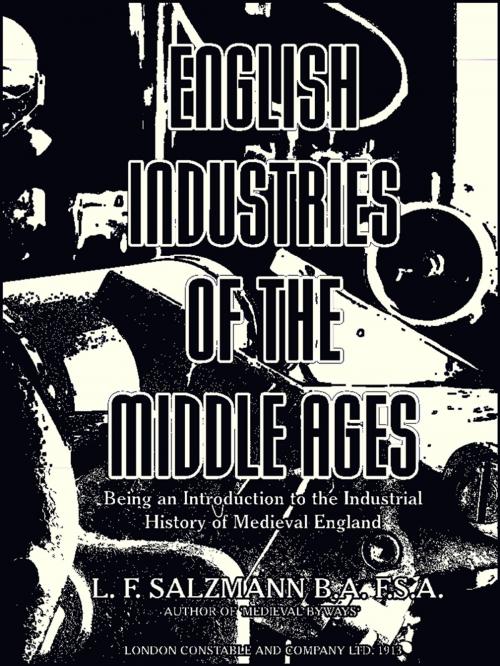English Industries of the Middle Ages
Being an Introduction to the Industrial History of Medieval England
Nonfiction, Science & Nature, Technology, Industrial Technology, Reference, History, British| Author: | Louis Francis Salzmann | ISBN: | 1230000333160 |
| Publisher: | CONSTABLE AND COMPANY LTD | Publication: | April 1, 2015 |
| Imprint: | Language: | English |
| Author: | Louis Francis Salzmann |
| ISBN: | 1230000333160 |
| Publisher: | CONSTABLE AND COMPANY LTD |
| Publication: | April 1, 2015 |
| Imprint: | |
| Language: | English |
Example in this ebook
The title of this book indicates at once its aim and its limitations. It makes no pretence to be a complete history of the early industrial life of England, but at the same time it does claim to be an introduction to the study of that subject. It is my hope, and indeed my belief, that from it the general reader, equipped with interest in the history of his country rather than with technical knowledge, will obtain something more than a bare outline of industrial conditions in pre-Elizabethan days. The student who is anxious to go more deeply into the subjects here treated may use this book as a road map and the footnotes as finger-posts to guide him to the heights of completer knowledge.
From the nature of my subject it was inevitable that the book should be full of technicalities, figures, and statistics, but it has been my endeavour to render the technicalities intelligible, and to prevent the significance of the statistics being obscured by an excess of detail. The scheme which I have adopted is to treat the leading medieval industries one by one, showing as far as possible their chief centres, their chronological development, the conditions and the methods of working. With the disposal of the finished products through intermediaries, merchants, or shopkeepers, I have not concerned myself, deeming such matters rather to belong to the realms of trade and commerce than of industry; and for this same reason, and also because it has been dealt with by other writers, I have not dealt with the great source of England's wealth—wool. Agriculture, also, and fishing I have excluded from my definition of industry. A more culpable omission, which I think calls for a word of explanation, is shown in the case of building. This, however, is not omitted by an oversight, nor yet through any desire to save myself trouble. I had collected a great mass of material for an intended section on the Building Industry, but after careful consideration I came to the conclusion that the material available was so exceedingly technical, and the obscurity of the details so greatly in excess of their value when elucidated, as to render such a section rather a weariness and a stumbling-block to the student than a help. The subjects treated in the several sections are thoroughly representative, if not completely exhaustive, of English industrial life, and a general survey of the subject is contained in my last chapter, where I have outlined as broadly as possible the general principles that governed the Control of Industry—the typical regulations made by, or for, the craftsmen in the interest of the employer, the workman, or the consumer. This last section might, of course, easily have been extended to cover more pages than this whole volume, but it is questionable whether multiplicity of detail tends to ease of assimilation. A single typical instance of a prevalent custom or regulation is as significant as a list of a dozen local variations, and far easier to remember. A rule is more easily remembered by one example than by a score, and with such a wealth of material as exists the risk of obscurity is greater from amplification than from concentration.
To be continue in this ebook
Example in this ebook
The title of this book indicates at once its aim and its limitations. It makes no pretence to be a complete history of the early industrial life of England, but at the same time it does claim to be an introduction to the study of that subject. It is my hope, and indeed my belief, that from it the general reader, equipped with interest in the history of his country rather than with technical knowledge, will obtain something more than a bare outline of industrial conditions in pre-Elizabethan days. The student who is anxious to go more deeply into the subjects here treated may use this book as a road map and the footnotes as finger-posts to guide him to the heights of completer knowledge.
From the nature of my subject it was inevitable that the book should be full of technicalities, figures, and statistics, but it has been my endeavour to render the technicalities intelligible, and to prevent the significance of the statistics being obscured by an excess of detail. The scheme which I have adopted is to treat the leading medieval industries one by one, showing as far as possible their chief centres, their chronological development, the conditions and the methods of working. With the disposal of the finished products through intermediaries, merchants, or shopkeepers, I have not concerned myself, deeming such matters rather to belong to the realms of trade and commerce than of industry; and for this same reason, and also because it has been dealt with by other writers, I have not dealt with the great source of England's wealth—wool. Agriculture, also, and fishing I have excluded from my definition of industry. A more culpable omission, which I think calls for a word of explanation, is shown in the case of building. This, however, is not omitted by an oversight, nor yet through any desire to save myself trouble. I had collected a great mass of material for an intended section on the Building Industry, but after careful consideration I came to the conclusion that the material available was so exceedingly technical, and the obscurity of the details so greatly in excess of their value when elucidated, as to render such a section rather a weariness and a stumbling-block to the student than a help. The subjects treated in the several sections are thoroughly representative, if not completely exhaustive, of English industrial life, and a general survey of the subject is contained in my last chapter, where I have outlined as broadly as possible the general principles that governed the Control of Industry—the typical regulations made by, or for, the craftsmen in the interest of the employer, the workman, or the consumer. This last section might, of course, easily have been extended to cover more pages than this whole volume, but it is questionable whether multiplicity of detail tends to ease of assimilation. A single typical instance of a prevalent custom or regulation is as significant as a list of a dozen local variations, and far easier to remember. A rule is more easily remembered by one example than by a score, and with such a wealth of material as exists the risk of obscurity is greater from amplification than from concentration.
To be continue in this ebook















